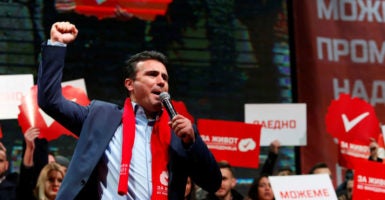In the economy of world politics, George Soros has billions at stake, and they extend even to remote places like the Republic of Macedonia.
In fact, the tiny Balkan state is becoming emblematic of a battle royale taking place in Europe between conservative parties that support traditional values and national sovereignty, and those—often funded by the liberal billionaire—with an ambitious agenda that includes liberal drug and sexual orientation policies as well as trans-nationalism.
Making things even more complicated are the Kremlin’s routine strategic interferences into the equation. Russian President Vladimir Putin’s vast propaganda network often intrudes into these disputes, whether invited in or not, by ostensibly taking up the traditionalists’ cause and going to war with his arch-nemesis, Soros.
In some places, such as Macedonia itself, there is one added variable: Obama-era embeds.
The Obama-appointed U.S. ambassador in Skopje, Jess Baily, has come under congressional scrutiny over accusations that he has shown a political bias against the Macedonian conservative party, VMRO, and that he facilitated coalition negotiations between the main leftist party and ethnic Albanian parties.
In a letter sent to Baily on Jan. 17, Republican members of the House and the Senate also asked him to explain reports that his embassy had selected Soros’ Open Society Foundations as the main implementer of U.S. Agency for International Development projects in Macedonia.
The State Department’s Feb. 6 response, which I had the chance to read, was thin on details regarding funding for Soros’ foundation and groups it controls.
Grants to them were awarded through a “competitive procurement process,” the letter said. The aid, it added, was to “strengthen the rule of law, increase economic growth, support regional security,” and pursue other nebulous goals.
But in fact, a Feb. 27 USAID announcement of a $2.54 million contract with the foundation revealed that the project included paying for training in “civic activism,” “mobilization,” and “civic engagement.”
Far from strengthening the rule of law or regional security, these are activities associated with the redefinition of civics as 1960s-style progressive political activism. They are all strategies straight out of Saul Alinsky’s subversion manual, “Rules for Radicals,” whose translation into Macedonian, incidentally, was funded by Soros’ foundation in 2014.

George Soros funnels billions of dollars to left-wing activist groups through his Open Society Foundations. (Photo: Maurizio Gambarini/picture alliance/dpa/Newscom)
One of the world’s richest men, Soros has a long history of intervening politically around the globe in the pursuit of his dream of open borders, global governance, and the erosion of regional particularism—what he calls the “open society.”
Because the State Department’s letter was “vague and failed to answer the questions we posed,” the same six Republican members of the House who wrote him—plus a new one, Rep. Trent Franks, R-Ariz.—last week asked the comptroller general of the Government Accountability Office to open an investigation and audit of the State Department and USAID regarding Macedonia and Soros’ foundation.
The legal watchdog Judicial Watch, for its part, has filed Freedom of Information Act requests asking that the State Department and USAID produce documents related to any grants, contracts, communications, assessments, etc. made by the department to the Foundation Open Society-Macedonia and its subsidiaries.
Whatever comes from these efforts, the political parties that the U.S. ambassador was helping negotiate—the leftist Social Democratic Union and three ethnic Albanian-based parties, the Democratic Union for Integration, Besa, and the Alliance of Albanians—did on Sunday reach an agreement to form a government.
But Macedonia’s president, Gjorge Ivanov, on Wednesday refused to give the Social Democratic Union a mandate to form a government because its leader, Zoran Zaev, acquiesced to the Albanian parties’ demand that Albanian become an official language throughout Macedonia.
The parties worked out the language deal next door in Tirana, Albania—one of the reasons Ivanov cited for withholding the mandate.
Albania is another country where the activities of Soros and his foundation are also under scrutiny for supporting the government of Prime Minister Edi Rama—a socialist who personally brokered the “Tirana Platform.” And in Albania, too, we find an Obama-era ambassador, Donald Lu, who backs the Soros-supported parties.
Rama, who is so close to Soros he attended his 2013 wedding, last week issued an impassioned plea for the U.S. not to abandon the Balkans to Russia, whose influence, he told The Telegraph, “is stronger than ever before.” “Russia,” he added, “has been interested in spreading its influence and there’s a lot of it in the region.”
Putin’s Kremlin routinely and opportunistically tries to maneuver itself into the politics of Europe. Senior Whitehall sources say it plotted to assassinate Montenegro’s prime minister last year.
In Macedonia, too, it has tried to portray itself as being on the side of the conservative VMRO, which leads the present government and won the most votes in the Dec. 11 elections. Even an article I wrote last month was quoted at length by Russia’s Sputnik International.
Reuters reported that on Thursday, March 2, Russia accused Albania, NATO, and the European Union of trying to impose a pro-Albanian government on Macedonia.
Far from backing pro-Putin policies, however, VMRO has long been a staunchly pro-U.S., pro-NATO party.
But our embassies’ notorious support for Soros and his progressive policies does irritate traditional-minded people in Macedonia and elsewhere.
“Some of my conservative friends in Macedonia are now telling me, ‘I hate America,’” Jason Miko, an American businessman who has been visiting the Balkan country for over two decades, told me. “They don’t really hate America. They hate what the Obama administration has done.”
“If Soros wants to spend his own money, then let him, but when he starts using taxpayer money it’s something else,” said Miko, Macedonia’s honorary consul in Arizona.





























